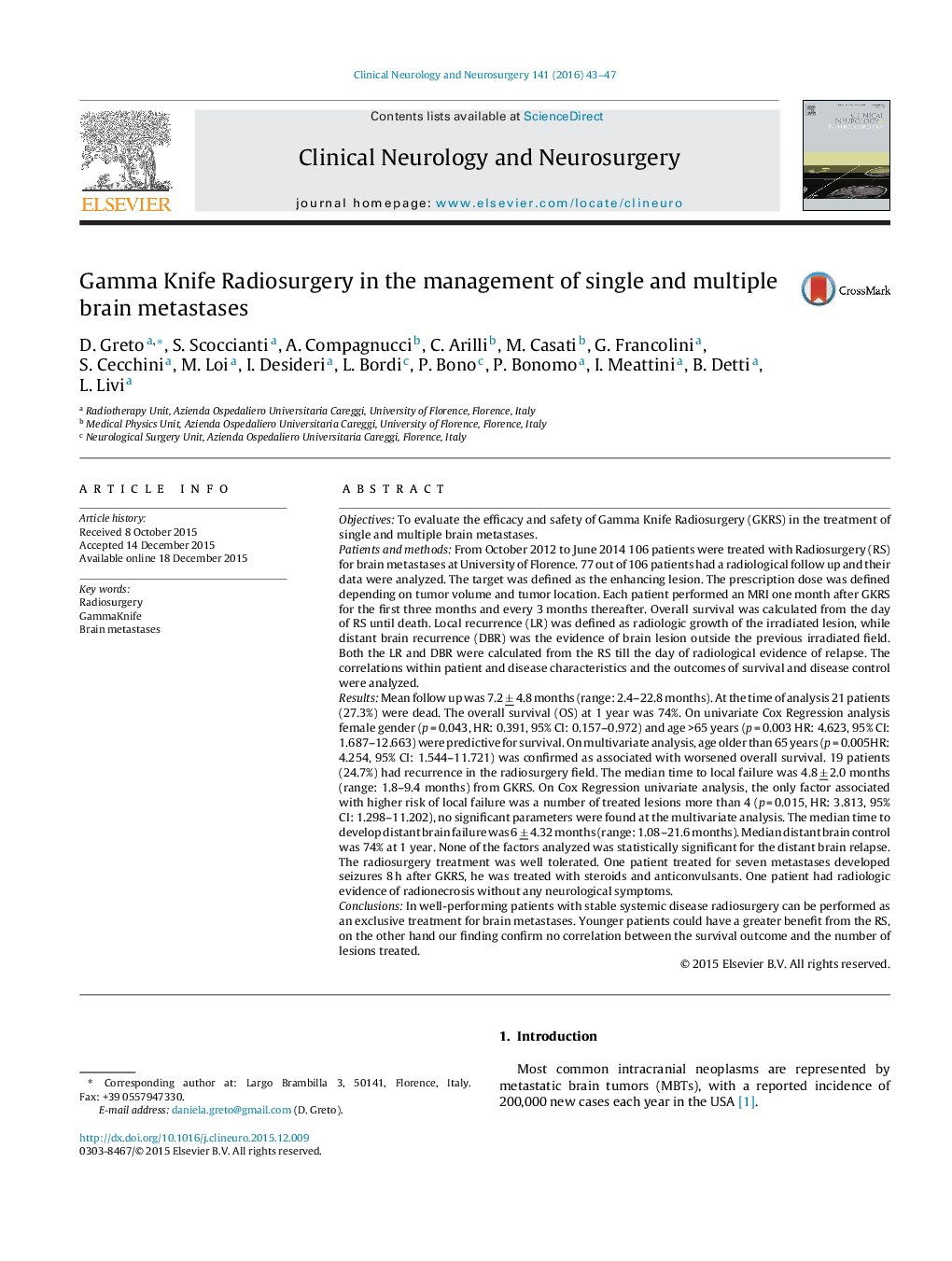| کد مقاله | کد نشریه | سال انتشار | مقاله انگلیسی | نسخه تمام متن |
|---|---|---|---|---|
| 3039577 | 1579681 | 2016 | 5 صفحه PDF | دانلود رایگان |
• Aim: evaluate efficacy and safety of Gamma Knife Radiosurgery for brain metastases.
• Results: GKRS is well tolerated and may be a valuable options in this setting.
• Younger patients may be particularly suitable for this technique.
• No correlation between survival outcome and the number of lesions treated.
ObjectivesTo evaluate the efficacy and safety of Gamma Knife Radiosurgery (GKRS) in the treatment of single and multiple brain metastases.Patients and methodsFrom October 2012 to June 2014 106 patients were treated with Radiosurgery (RS) for brain metastases at University of Florence. 77 out of 106 patients had a radiological follow up and their data were analyzed. The target was defined as the enhancing lesion. The prescription dose was defined depending on tumor volume and tumor location. Each patient performed an MRI one month after GKRS for the first three months and every 3 months thereafter. Overall survival was calculated from the day of RS until death. Local recurrence (LR) was defined as radiologic growth of the irradiated lesion, while distant brain recurrence (DBR) was the evidence of brain lesion outside the previous irradiated field. Both the LR and DBR were calculated from the RS till the day of radiological evidence of relapse. The correlations within patient and disease characteristics and the outcomes of survival and disease control were analyzed.ResultsMean follow up was 7.2 ± 4.8 months (range: 2.4–22.8 months). At the time of analysis 21 patients (27.3%) were dead. The overall survival (OS) at 1 year was 74%. On univariate Cox Regression analysis female gender (p = 0.043, HR: 0.391, 95% CI: 0.157–0.972) and age >65 years (p = 0.003 HR: 4.623, 95% CI: 1.687–12.663) were predictive for survival. On multivariate analysis, age older than 65 years (p = 0.005HR: 4.254, 95% CI: 1.544–11.721) was confirmed as associated with worsened overall survival. 19 patients (24.7%) had recurrence in the radiosurgery field. The median time to local failure was 4.8 ± 2.0 months (range: 1.8–9.4 months) from GKRS. On Cox Regression univariate analysis, the only factor associated with higher risk of local failure was a number of treated lesions more than 4 (p = 0.015, HR: 3.813, 95% CI: 1.298–11.202), no significant parameters were found at the multivariate analysis. The median time to develop distant brain failure was 6 ± 4.32 months (range: 1.08–21.6 months). Median distant brain control was 74% at 1 year. None of the factors analyzed was statistically significant for the distant brain relapse. The radiosurgery treatment was well tolerated. One patient treated for seven metastases developed seizures 8 h after GKRS, he was treated with steroids and anticonvulsants. One patient had radiologic evidence of radionecrosis without any neurological symptoms.ConclusionsIn well-performing patients with stable systemic disease radiosurgery can be performed as an exclusive treatment for brain metastases. Younger patients could have a greater benefit from the RS, on the other hand our finding confirm no correlation between the survival outcome and the number of lesions treated.
Journal: Clinical Neurology and Neurosurgery - Volume 141, February 2016, Pages 43–47
